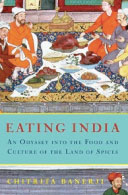
In the Danger Zone
by Stefan Gates
288pp, BBC Books, £15.99
Eating India
by Chitrita Banerji
288pp, Bloomsbury, £12.99
Some conversations encourage hyperbole: between fishermen; of teenage boys on sex; over dinner about food. These last will drift on to restaurant bills we have known, wines of unimagined age, and dishes of furious unpleasantness. On this last topic, Stefan Gates would stop the banter dead. He really has eaten everything: yak's penis and assorted genitalia (always male, except once when he hears of donkey vulva), insects of every hue, fresh whale blubber, eyes, tongues, and the most unlikely vegetables. He seems unshockable, which serves only to irritate his Mexican minder as he swallows fly eggs, ant eggs, duck tripe, braised snake and chicken blood tortillas without demur.
Gates's book arises out of his TV series in which each week he flies off to a different part of the world where man has managed to mess things up: Afghanistan, Ethiopia, Haiti and so on. He looks at the food being sold and eaten, the reasons it is like it is, and then will try his hand at cooking it. The cooking makes good television; the rights and wrongs of each situation, however, make better reading, or would if it were not such a helter-skelter catalogue of impossible dilemmas.
Using food as his touchstone does throw up some chewy points about things we take for granted. We usually reckon to avoid acute hunger pangs; we expect a certain level of flavour; and we are happy to ignore great swathes of the food chain (feet, heads, innards, seeds and roots). We rarely think of using food as a weapon of social discrimination, of war or of political domination. Yet all these negatives and diabolical positives are everyday realities in the places that Gates visits. Some of the spectres are so large he cannot get a grip, but when dealing with tangible facts such as the incessant tedium of splodge and porridge made from World Food Programme maize flour and corn soy blend in Uganda, or the four-hour hunt for three minuscule frogs and one tiny fish to add variety to the rice dole of Karen refugees on the Thai-Burmese border he hits many bulls-eyes of wonder and outrage.
Most of these disasters are cumulative, so that decades of misrule, overpopulation, the Big Brother tactics of Washington and agricultural dumping that seems to benefit no one save the pig breeders of the Carolinas results in the desertification and rock-bottom ghastliness of Haiti. It seems an insult to devote a bare 20 pages to the subject, but Gates does empathy well, as well as affront, and manages to pack in considerable enlightenment.
His real villain is not the United States (which never comes out smelling of roses) but social change. You can't always do a lot about it. Chitrita Banerji tries to pin down similar shifting patterns of life in her own country of India in a travelogue that takes in most of its regions. As in Gates's book, food is the subject, but it's difficult to exclude wider issues from the kitchen.
In her case, it's the big historical picture of invasion, migration and colonisation. It's the bewildering mosaic of religions and their particular culinary taboos. It's the effects of economic development on a relatively traditional society. Too much, the reader might say, for one small book, but she handles it well, with many telling examples to provoke further investigation. Why should the Hindus of Calcutta forbid eating radishes in the spring? Why should Jains exclude all root vegetables? What's with the Buddhists and meat? Although some taboos respond to functional explanation (dirt, ill health, and so on), others are a mystery. Then she fetches up among the Syrian Christians of Kerala, who have been there since the 3rd century AD, and here is a group without one taboo, omnivores all. You lurch towards an explanation of the history of the world.
If only it were so easy. But Banerji is worth reading: thoughtful, well expressed, informative, even if sometimes the description of spices and flavours leaves you yearning for the foods themselves. A book like this is akin to a painter's biography without a single picture. Tom Jaine runs Prospect Books, a specialist food imprint.

